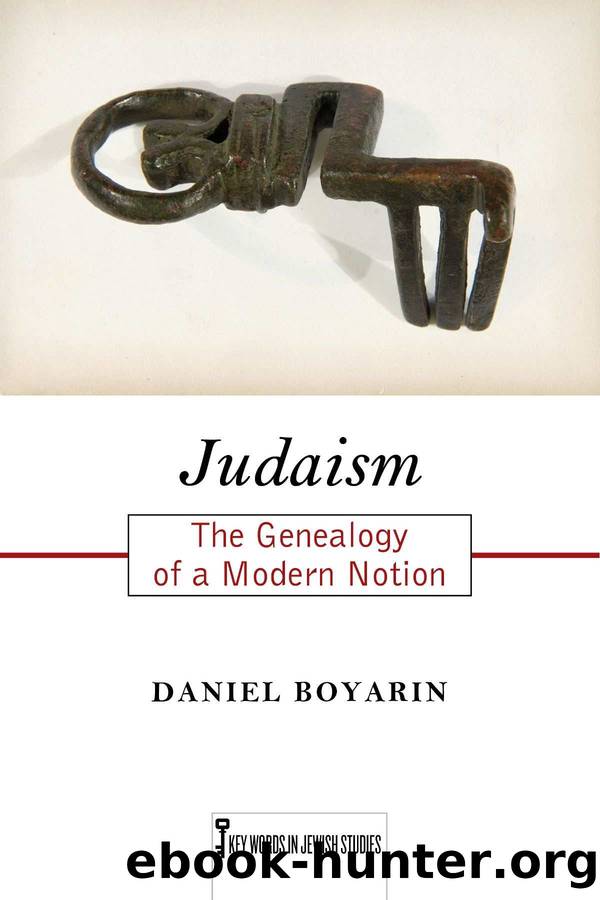Judaism: The Genealogy of a Modern Notion (Key Words in Jewish Studies) by Daniel Boyarin

Author:Daniel Boyarin [Boyarin, Daniel]
Language: eng
Format: azw3
Tags: REL040090 Religion / Judaism / Theology, REL040030 Religion / Judaism / History, HIS037000 History / World
ISBN: 9780813571614
Publisher: Rutgers University Press
Published: 2018-10-21T16:00:00+00:00
I exhort you to do nothing from partisanship but in accordance with Christâs teaching. For I heard some say, âunless in the archives I find (it), in the gospel I do not believe (it),â82 and when I said, âIt is written,â they answered me, âThat is just the question.â But for me the archives are Jesus Christ, the inviolable archives are his cross and death and his resurrection and faith through himâin which, through your prayers, I want to be justified. (8:2)83
Once we concede that it is not written, fixed gospel texts that are being referred to here, it makes perfect sense that some would say that if they cannot ground it in the Scripture they do not believe it in the Gospel. These Christian adherents of what Ignatius called Ioudaismos simply deny as part of the Gospel itself anything of the story of Jesus that contradicts Scripture or isnât grounded in Scripture. The group in Philadelphia to which the future martyr is objecting so strongly would be, on this reading, Christians who insist that the Gospel can only contain scriptural truth, and this was acceptable to the Philadelphian congregation with whom they were in communion. For Ignatius there is, in contrast, only one source of truthâthat is, the Gospel, the narrative of Jesusâs actual death and resurrection. That must be the correct interpretationâwhether or not Ignatius had some sort of written texts about Jesusâfor otherwise the statement that the âArchives are Jesus Christ, his cross and deathâ makes no sense.
âGospel,â I suggest, for Ignatius, functions semantically very much as it does in Paul, exceptâand this is criticalâfor Paul, the opposition is Gospel/Nomos while for Ignatius, the opposition is Gospel/Scripture, accepting the Good News of Jesusâs actual physical death and resurrection versus exegeting the Bible.84 The somewhat confounding moment, however, is Ignatiusâs statement that âit is written,â which seems to counteract this view. There are two possible interpretations that I would suggest: the one is that Ignatius first simply declares that whatever he claims as in the Gospel is / must be already written in the Archives, and when they retort that that is the question, he resorts to his claim that the Gospel is the Archives, the only Archives that matter. A second possibility would be that when Ignatius says âit is written,â he already means it is written, as it were, in the only Archives that matter to himâJesus Christ, his death and resurrection in the flesh. They misunderstand, retorting that it is not written, which he then clarifies with his Jesus archive. That is exactly the question that they put to Ignatius: âThey answered me, âThat is just the question,ââ to wit. Indeed, Ignatius, whether or not the physical death of the Son of Man is written in the Archives is precisely the question. For Ignatius, however, for whom the nonscriptural kerygma is central and who sees, as he insists over and over, such reliance on Scripture as itself Ioudaismos, the exegeting of Jewish Scriptures, and not Christianismos, the exegeting of Christâs birth, actual death, and resurrection in the flesh.
Download
This site does not store any files on its server. We only index and link to content provided by other sites. Please contact the content providers to delete copyright contents if any and email us, we'll remove relevant links or contents immediately.
| Haggadah | Hasidism |
| History | Holidays |
| Jewish Life | Kabbalah & Mysticism |
| Law | Movements |
| Prayerbooks | Sacred Writings |
| Sermons | Theology |
| Women & Judaism |
The Power of Habit by Charles Duhigg(3128)
Man's Search for Meaning by Viktor E. Frankl(2669)
Mckeown, Greg - Essentialism: The Disciplined Pursuit of Less by Mckeown Greg(2440)
MOSES THE EGYPTIAN by Jan Assmann(2412)
Devil, The by Almond Philip C(2325)
The Complete Dead Sea Scrolls in English (7th Edition) (Penguin Classics) by Geza Vermes(2277)
Unbound by Arlene Stein(2268)
I Capture the Castle by Dodie Smith(2034)
Schindler's Ark by Thomas Keneally(1879)
The Invisible Wall by Harry Bernstein(1799)
The Gnostic Gospel of St. Thomas by Tau Malachi(1793)
The Bible Doesn't Say That by Dr. Joel M. Hoffman(1677)
The Secret Doctrine of the Kabbalah by Leonora Leet(1607)
Political Theology by Carl Schmitt(1577)
The Jewish State by Theodor Herzl(1533)
A History of the Jews by Max I. Dimont(1529)
The Dead Sea Scrolls Bible by Martin G. Abegg(1513)
The Book of Separation by Tova Mirvis(1485)
Oy!: The Ultimate Book of Jewish Jokes by David Minkoff(1369)
